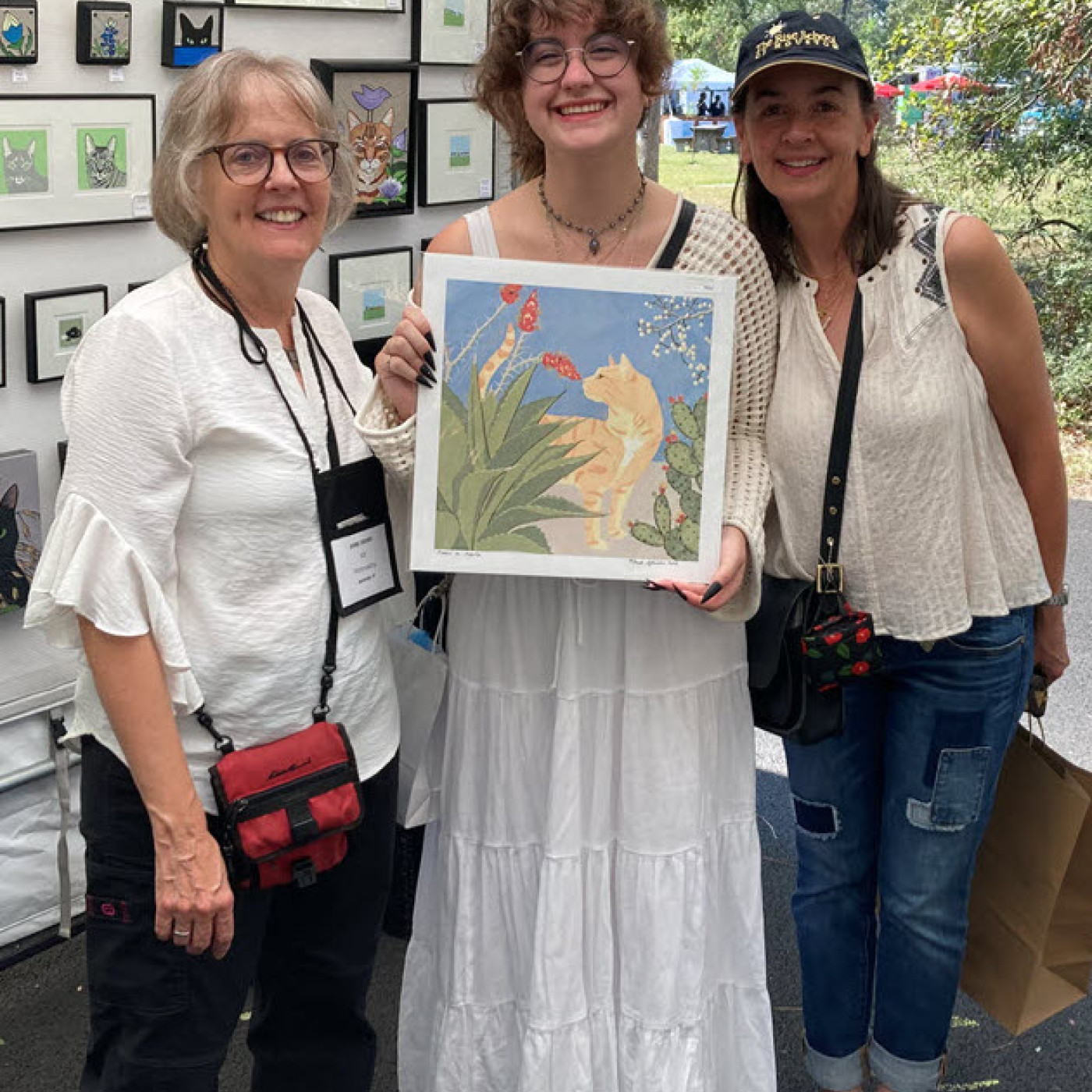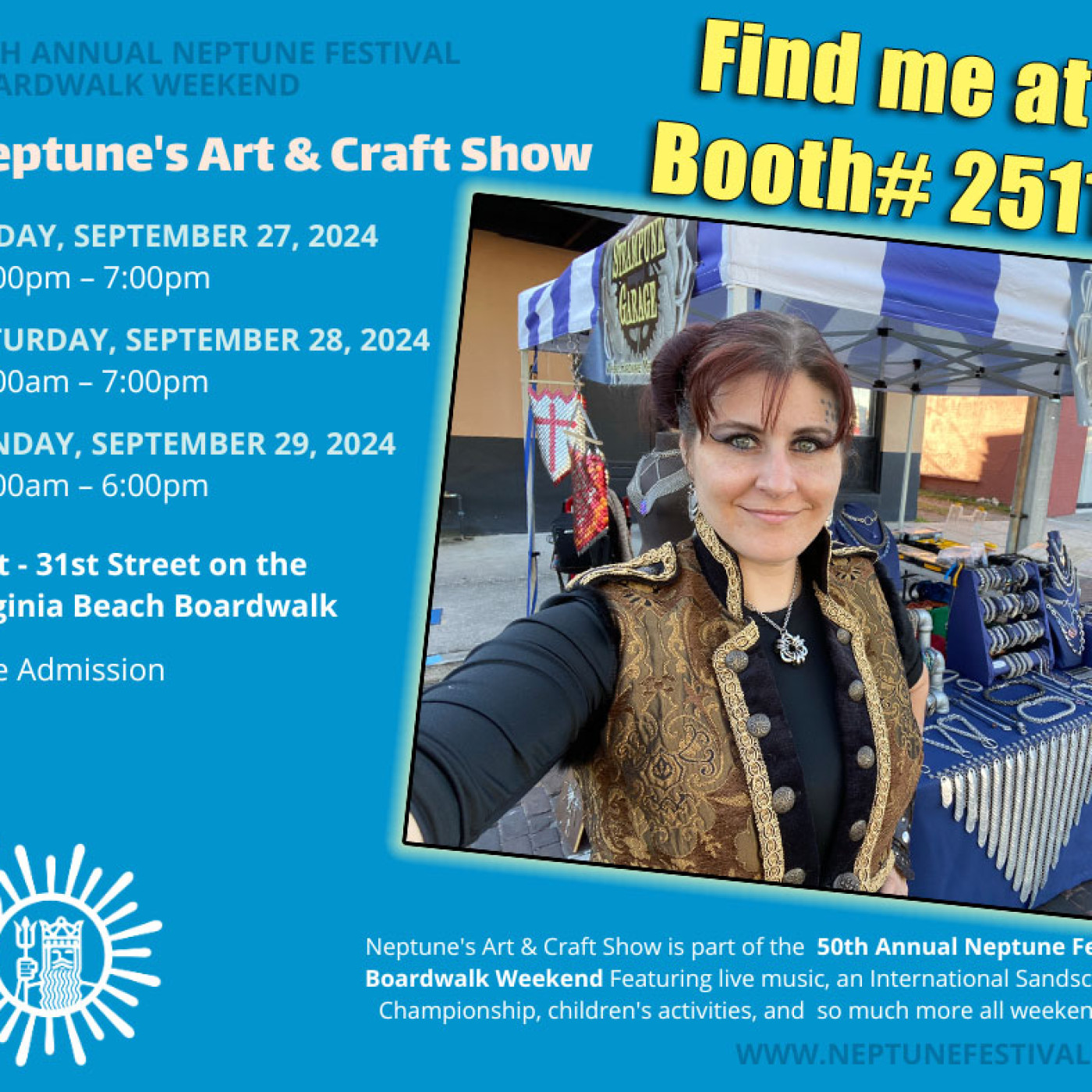Let’s Talk About Show Lulls Artists Share How They Handle Them
The threat of rain or extreme heat, as well as competing events and a lack of promotion, can result in slow periods during an art festival. See how some artists deal with this when it happens.
Anne Gaines
Printmaking & Mixed Media
How long have you been participating in shows?
More than 20 years.
What do you do when a show has a slow time?
During a slow time in a show, I like to rearrange the art in my booth. If I’m at work in the booth, customers that might be too shy to enter will often feel more comfortable and come on in. If the show has slower spells, I will make sketches of new work that I’d like to create. In addition, slow times are the perfect opportunity to get to know my neighbors at the show and perhaps purchase or trade art with them.
What have you seen other artists do during show lulls?
I’ve seen other artists look at their phones or read a book, which I don’t think is a great idea. And rarely, I’ve seen artists get angry and start packing up their booth early, which I think is a terrible idea. Show promoters can do all the right things to market a show, but they cannot control the weather or make people attend their events. I love to see artists take a slow time and set up their easels and paint. It’s such a great idea to use their time to make more inventory! As a printmaker, I’m not able to do that!
What is a tip or piece of advice an artist shared that helped you get through slow periods?
It wasn’t advice, but one year during lulls in a show, I watched a wonderful glass artist give a piece of his art to a child, a veteran, or someone who loved his work but could not afford to buy it. That really made a positive impression on me.

From your experience, what have been the top causes of lulls in traffic and sales?
Other events (sporting, etc.) that occur at the same time; a downturn in the economy; bad weather; poor marketing; difficulty in getting to/from show and/or limited parking; no places to buy food; not enough space to navigate crowds and see into booths; no place to sit and rest/cool down.
Do you have additional thoughts or advice on this topic?
It is hard if there are a lot of slow times in a show. I try to make the best of those times and not get too stressed about not selling. It is a challenge for sure, but I’m much happier if I keep a positive attitude. And I try not to overwhelm people when they finally do come into the booth!
Carolyn Jones
Jewelry
How long have you been participating in shows?
Twelve years.
What do you do when a show has a slow time?
If a show is having a slow time, I take advantage of that time to eat a quick snack to recharge or ask my neighbor artist to keep an eye on my booth while I run to the bathroom. I also might rearrange my display, clean the glass cases, and tidy up. If the slow time drags on, I get out my notebook and sketch out ideas, think about what I might want to do for setup at future shows, etc. Chatting with neighbor artists is also a way to pass the time — until either the show picks up or it's the end of the day.
What have you seen other artists do during show lulls?
It never helps when other artists start venting and being negative about the slow time. A quick, "Is it slow, or is it me?" is OK, but going on and on about how awful it is can drive away any potential customers that might be nearby and just adds a negative feeling to the situation.
What is a tip or piece of advice an artist shared that helped you get through slow periods?
An artist told me she uses the time to sketch (she's a fantastic painter), and it inspired me to work on my own ideas and keep the time I'm at the show productive, rather than just a waste.
From your experience, what have been the top causes of lulls in traffic and sales?
Weather is a huge factor. If it's a beastly hot day, most shoppers will come in the morning and just stay home after lunch. Rain also keeps a lot of shoppers home, but I've also had some amazing sales days during rain because only the really determined shoppers come out.
Richard Lang
Oil
How long have you been participating in shows?
Eighteen years.
What do you do when a show has a slow time?
I keep a notebook with me and make notes on setup, improvements, inventory, and all the little things to make prepping and working the next show great. By the end of the year, it's a smooth operation.
From your experience, what have been the top causes of lulls in traffic and sales?
The only consistent lulls have been when shows encroach on dinnertime. People are on the way to eat.
Jenifer Martinez
Jewelry
How long have you been participating in shows?
Twenty-plus years.
What do you do when a show has a slow time?
I talk to other vendors about alternate shows, work on online orders, and prep more inventory for future shows.

What have you seen other artists do during show lulls?
Read, nap, play on their phones, or socialize with each other.
What is a tip or piece of advice an artist shared that helped you get through slow periods?
Never fall into the trap of snacking when bored. Stay motivated by using show hours as work hours — you can always be tweaking your online store or working on social media if there are no people shopping in person. Get the online sales working for you!
From your experience, what have been the top causes of lulls in traffic and sales?
Bad weather, poor marketing by the show runners.
